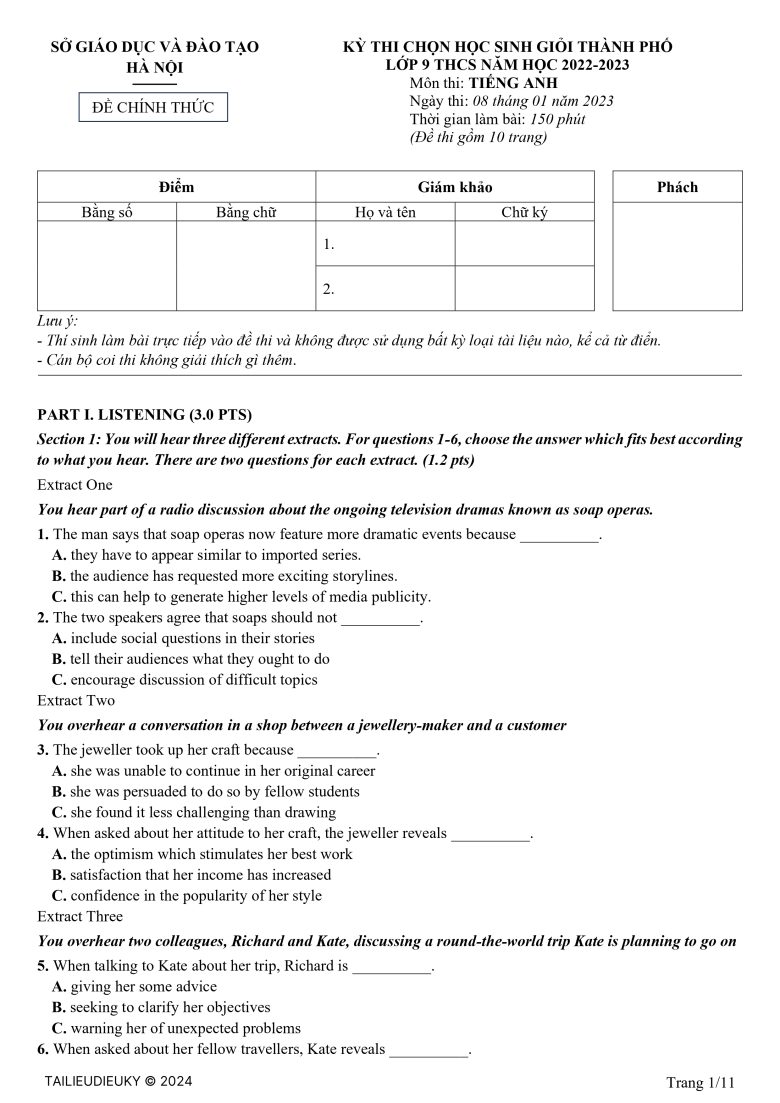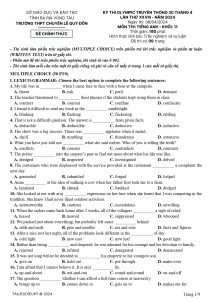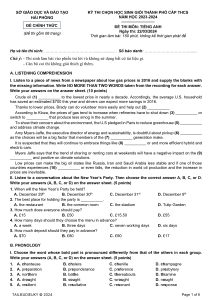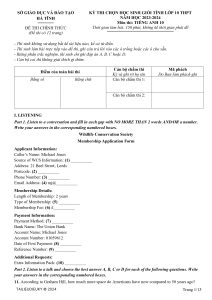Cập nhật chi tiết Đề thi HSG Tiếng Anh 9 cấp thành phố Hà Nội năm học 2022-2023 có đáp án. Bài thi môn Tiếng Anh được tổ chức trong khuôn khổ Kỳ thi chọn học sinh giỏi thành phố Hà Nội các môn văn hóa và môn khoa học lớp 9 cấp trung học cơ sở năm học 2022-2023 diễn ra vào ngày 08 tháng 01 năm 2023. Đề thi chính thức đánh giá toàn diện kỹ năng sử dụng Tiếng Anh của thí sinh qua 3 kĩ năng: Nghe, Đọc, Viết.
Quý phụ huynh và các bạn học sinh có thể tải xuống tài liệu tại website Tài liệu diệu kỳ để làm quen các dạng bài tập có trong đề thi Đề thi HSG Tiếng Anh 9 cấp thành phố Hà Nội và chuẩn bị cho Kỳ thi Tuyển sinh vào lớp 10 THPT tại TP sắp tới.
PART I. LISTENING (3.0 PTS)
In Part I, you'll listen to three extracts and answer questions based on them, covering topics like soap operas, craftsmanship, and travel plans. In Section 2, you'll hear a radio program about actress Helen Perry's life, filling in blanks with key information about her career and achievements.
PART II. PHONETICS (2.0 PTS)
In Part II, you'll identify pronunciation and stress patterns. For the pronunciation section, circle the word with a different underlined part. In the stress pattern section, circle the word with a different main stress pattern.
PART III. VOCABULARY - GRAMMAR (4.0 PTS)
In Part III, you'll complete sentences with the best options, identify synonyms and antonyms, fill in the correct forms of words, and complete sentences with verbs and particles. Lastly, you'll think of a word that fits all three sentences given.
PART IV. READING (6.0 PTS)
In I (Guided Cloze), you'll choose the best option to complete the passage, selecting the most appropriate words to fit the context. In II (Open Cloze), you'll fill in the gaps in a passage with suitable words, considering the meaning and flow of the text. Lastly, in III (IELTS Reading: Matching Headings), you'll match headings to sections of a reading passage and answer multiple-choice questions based on the passage.
PART V. WRITING (5.0 PTS)
In Part V, you'll be completing sentences to convey similar meanings, rewriting sentences using given words, and writing an essay on a provided question.
Đáp án gợi ý xem tại cuối bài viết.
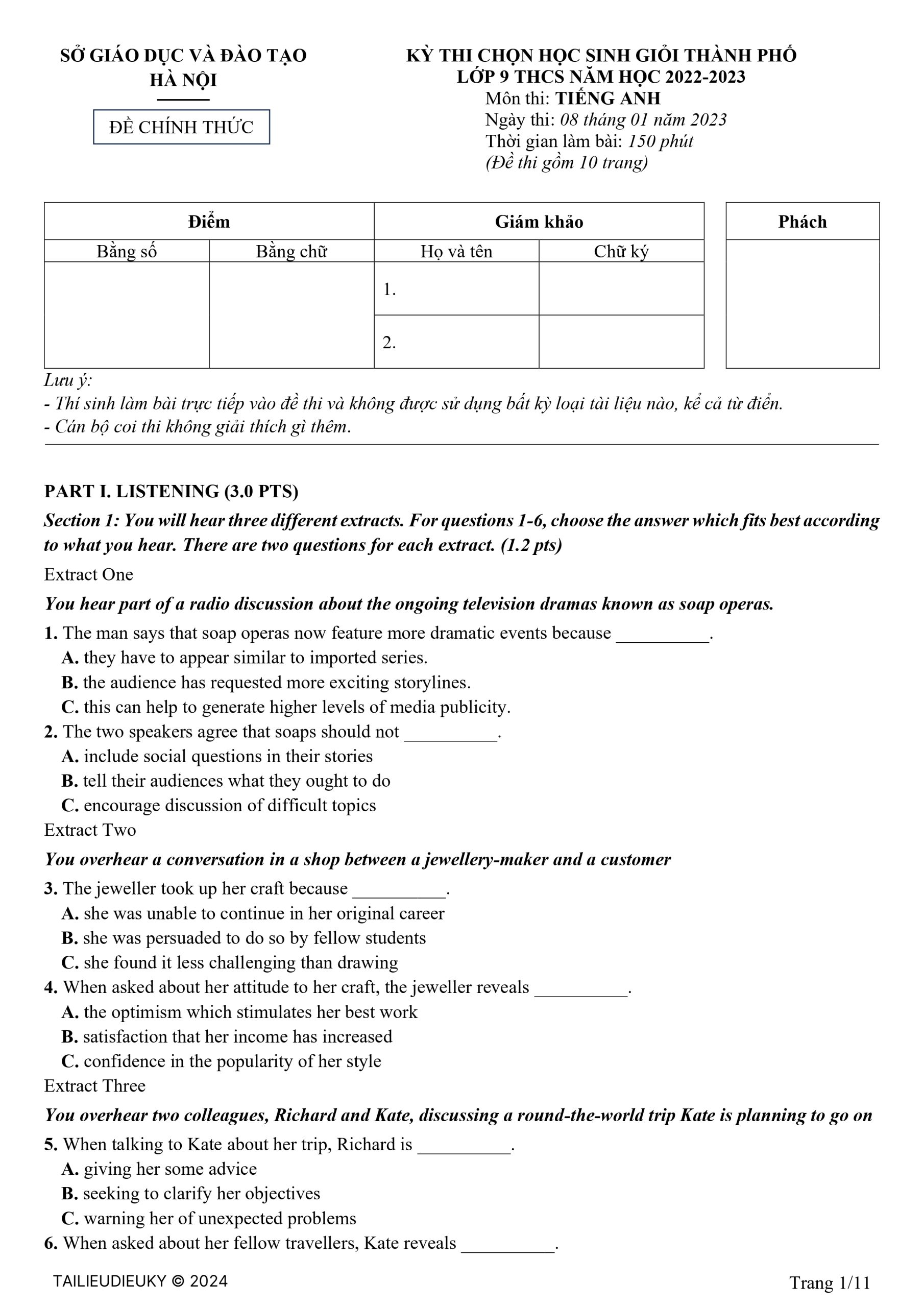
Đề thi HSG Tiếng Anh 9 cấp thành phố Hà Nội năm học 2022-2023 - ĐỀ CHÍNH THỨC - Trang 1/10
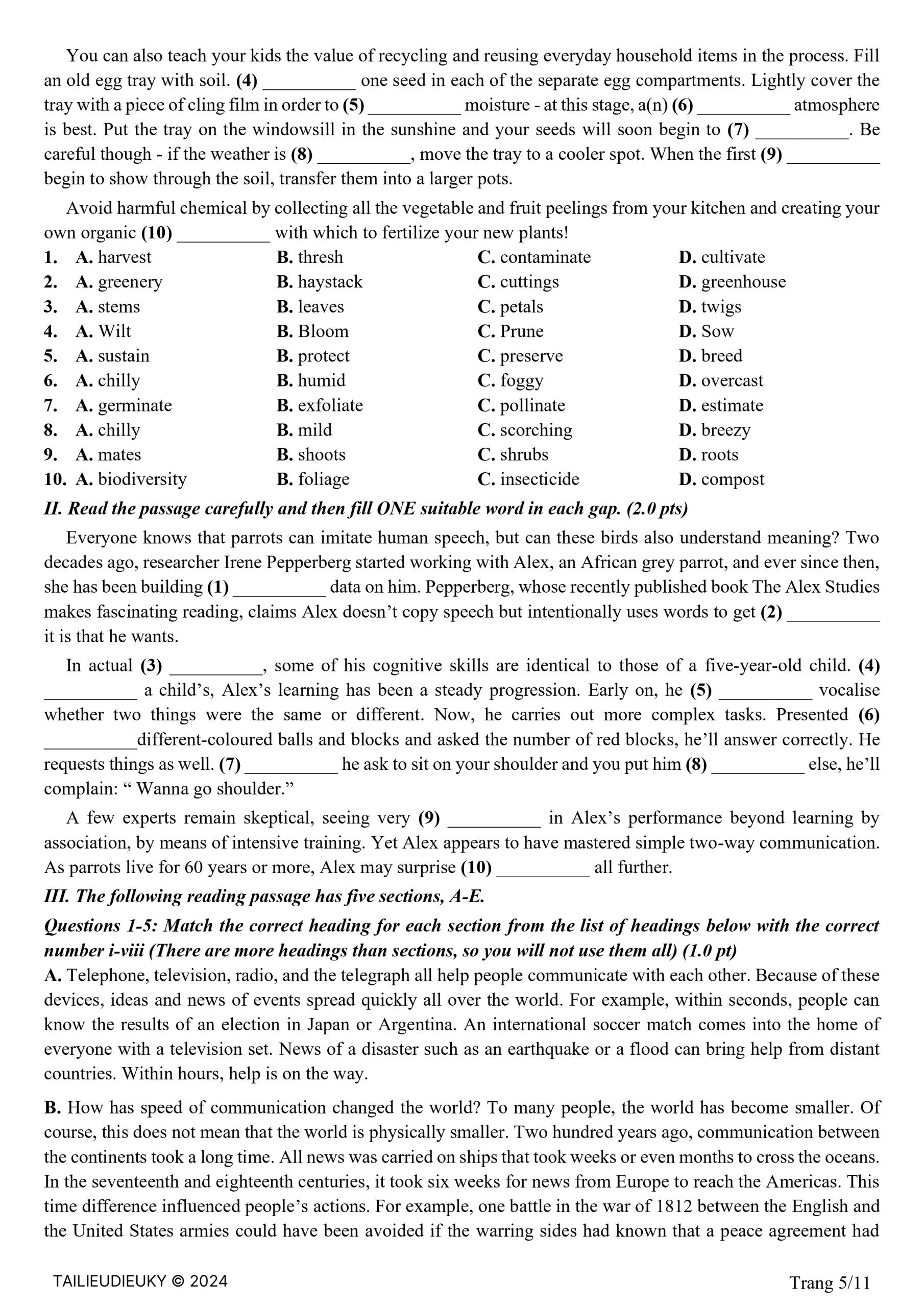
Đề thi HSG Tiếng Anh 9 cấp thành phố Hà Nội năm học 2022-2023 - ĐỀ CHÍNH THỨC - Trang 5/10
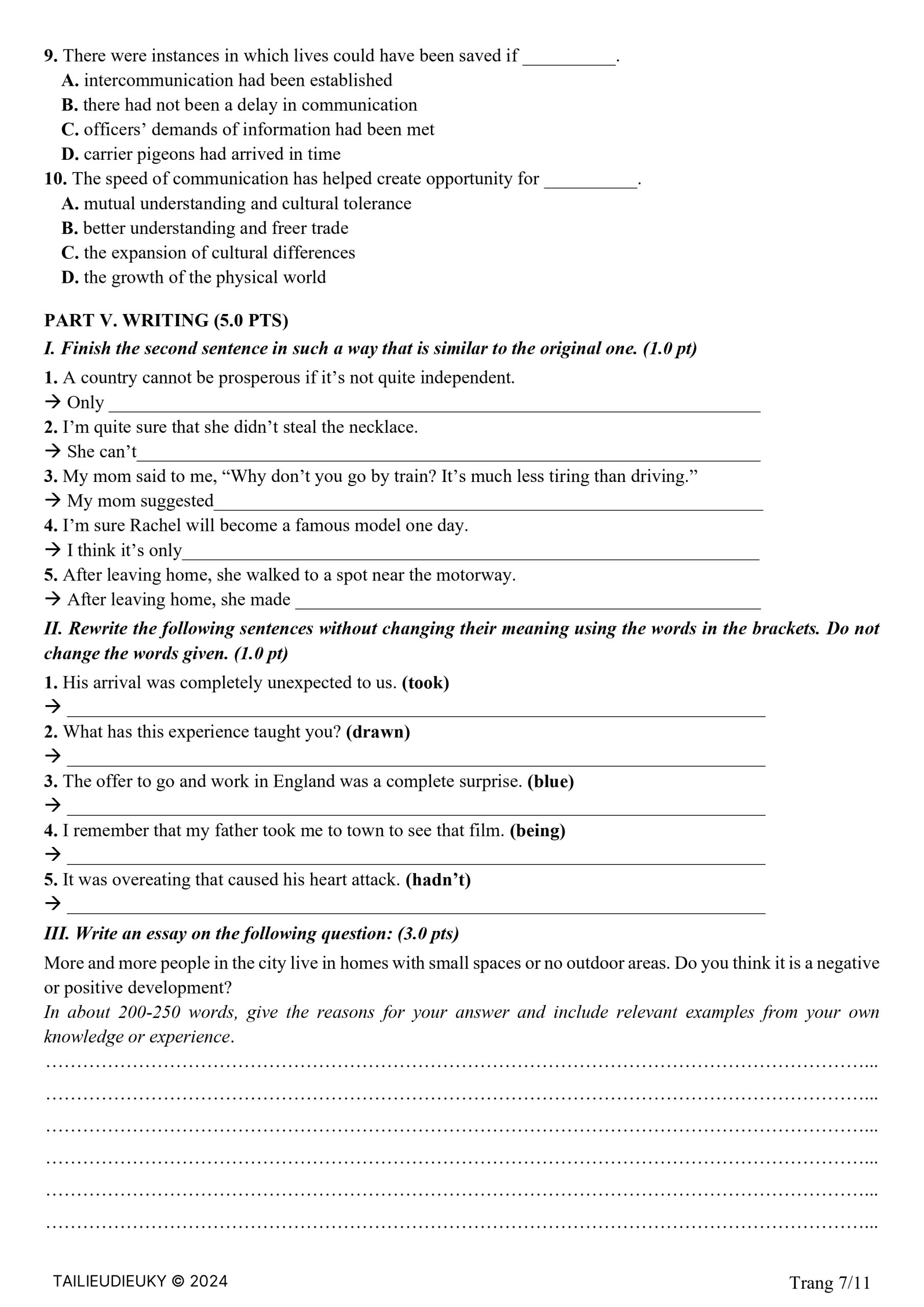
Đề thi HSG Tiếng Anh 9 cấp thành phố Hà Nội năm học 2022-2023 - ĐỀ CHÍNH THỨC - Trang 7/10
Đáp án gợi ý Đề thi HSG Tiếng Anh 9 cấp thành phố Hà Nội năm học 2022-2023
SỞ GIÁO DỤC VÀ ĐÀO TẠO
HÀ NỘI
KỲ THI CHỌN HỌC SINH GIỎI THÀNH PHỐ
LỚP 9 THCS NĂM HỌC 2022-2023
Môn thi: TIẾNG ANH
Ngày thi: 08 tháng 01 năm 2023
Thời gian làm bài: 150 phút
(Đề thi gồm 10 trang)
PART I. LISTENING (3.0 PTS)
Section 1. 1 C
2 B
3 A
4 A
5 B
6 C
Section 2. 7 Helen’s father
8 memorizing lines
9 eye operation
10 comic
11 perfume
12 plays
13 reviews
14 the public
15 reward
PART II. PHONETICS (2.0 PTS)
I. 1 B
2 C
3 A
4 C
5 D
II. 1 B
2 A
3 A
4 B
5 C
PART III. VOCABULARY - GRAMMAR (4.0 PTS)
I. 1 C
2 A
3 A
4 D
5 A
6 A
7 D
8 D
9 C
10 C
11 D
12 D
13 C
14 B
15 A
II. 1 C
2 B
III. 1 C
2 C
IV. 1 invariably
2 alternatively
3 descriptive
4 observations
5 opinionated
6 enthusiasm
7 unpredictable
8 irregular
V. 1 put away
2 called up
3 go off
4 taken on
5 dwelling on
6 worn out
7 gone up
8 standing in
VI. 1 charge
2 afford
3 clear
4 change
5 show
PART IV. READING (6.0 PTS)
I. 1 D
2 A
3 B
4 D
5 A
6 B
7 A
8 C
9 B
10 D
II. 1 up
2 what
3 fact
4 Like
5 could
6 with
7 If
8 somewhere
9 little
10 us
III. 1 iv. Communication devices
2 iii. Our shrinking world
3 v. A brief history of communication development
4 i. A disadvantage of fast communication
5 viii. Modern communication and expected
6 C
7 D
8 D
9 B
10 B
PART V. WRITING (5.0 PTS)
I. 1 Only a quite independent country can be prosperous.
2 She can’t have stolen the necklace.
3 My mom suggested that I should go by train because it was much less tiring than driving.
4 I think it’s only a matter of time before Rachel becomes a famous model.
5 After leaving home, she made her way to a spot near the motorway.
II. 1 He took us completely by surprise with his arrival.
2 What lessons have you drawn from this experience?
3 The offer to go and work in England came out of the blue.
4 I remember being taken to town by my father to see that film.
5 If he hadn’t overeaten, he wouldn’t have had a heart attack.
III. Essay writing.
Nội dung đề thi Tiếng Anh trong Kỳ thi chọn HSG cấp thành phố Hà Nội
SỞ GIÁO DỤC VÀ ĐÀO TẠO
HÀ NỘI
KỲ THI CHỌN HỌC SINH GIỎI THÀNH PHỐ
LỚP 9 THCS NĂM HỌC 2022-2023
Môn thi: TIẾNG ANH
Ngày thi: 08 tháng 01 năm 2023
Thời gian làm bài: 150 phút
(Đề thi gồm 10 trang)
Điểm Giám khảo Phách
Bằng số Bằng chữ Họ và tên Chữ ký
1.
2.
Lưu ý:
- Thí sinh làm bài trực tiếp vào đề thi và không được sử dụng bất kỳ loại tài liệu nào, kể cả từ điển.
- Cán bộ coi thi không giải thích gì thêm.
PART I. LISTENING (3.0 PTS)
Section 1: You will hear three different extracts. For questions 1-6, choose the answer which fits best according to what you hear. There are two questions for each extract. (1.2 pts)
Extract One
You hear part of a radio discussion about the ongoing television dramas known as soap operas.
1. The man says that soap operas now feature more dramatic events because __________.
A. they have to appear similar to imported series.
B. the audience has requested more exciting storylines.
C. this can help to generate higher levels of media publicity.
2. The two speakers agree that soaps should not __________.
A. include social questions in their stories
B. tell their audiences what they ought to do
C. encourage discussion of difficult topics
Extract Two
You overhear a conversation in a shop between a jewellery-maker and a customer
3. The jeweller took up her craft because __________.
A. she was unable to continue in her original career
B. she was persuaded to do so by fellow students
C. she found it less challenging than drawing
4. When asked about her attitude to her craft, the jeweller reveals __________.
A. the optimism which stimulates her best work
B. satisfaction that her income has increased
C. confidence in the popularity of her style
Extract Three
You overhear two colleagues, Richard and Kate, discussing a round-the-world trip Kate is planning to go on
5. When talking to Kate about her trip, Richard is __________.
A. giving her some advice
B. seeking to clarify her objectives
C. warning her of unexpected problems
6. When asked about her fellow travellers, Kate reveals __________.
A. her level of respect for them
B. her degree of dependence on them
C. her feelings of affection towards them
II. Section 2: You will hear part of a radio programme in which an expert on theatre history is talking about the life of a famous actress called Helen Perry. For questions 7-15, fill in each blank with NO MORE THAN THREE WORDS according to what you hear. (1.8 pts)
The common view that acting was an unsuitable career for a woman was share by (7) ____________________. Helen admitted that her greatest problems in acting involved (8) ____________________. In her fifties, Hele had to have a dangerous (9) ____________________ which saved her career. Helen’s broad popularity reflects her skill as both a (10) ____________________ and a classical actress. Helen was so popular that a brand of (11) ___________________ was named after her. Evidence of Helen’s skill as a writer can be found in some of the (12) __________ that she wrote. We can get an idea of the quality of her later performances from (13) ____________________ of the time. What pleased Helen most was the attention she received from (14) __________ and that was all the (15) ____________________ she really needed.
PART II. PHONETICS (2.0 PTS)
I. Choose the word whose underlined part is pronounced differently from that of the others by circling A, B, C or D. (1.0 pt)
1. A. possession B. massage C. impressive D. passage
2. A. dealt B. meant C. heal D. threat
3. A. hatred B. stopped C. dedicated D. decided
4. A. surplus B. surgery C. surprise D. surface
5. A. chaos B. toothache C. watch D. archeology
II. Choose the word whose main stress pattern is different from that of the others by circling A, B, C or D. (1.0 pt)
1. A. understand B. quality C. radical D. business
2. A. altogether B. synonymous C. manufacture D. independent
3. A. image B. purchase C. mislead D. deadline
4. A. memorial B. diameter C. beneficial D. considerate
5. A. necessary B. infamous C. automobile D. technique
PART III. VOCABULARY - GRAMMAR (4.0 PTS)
I. Circling the best option A, B, C or D to complete the following sentences. (1.5 pts)
1. Sky Airlines __________ safety standards were considered so poor that its planes were banned in Europe in 2002 has improved greatly in recent years
A. who B. whom C. whose D. whoever
2. A prize of $25,000 is offered to whoever __________ the one-hour cycling record of 90 kilometers.
A. breaks B. tears C. rips D. splits
3. It was not until they sent me the invitation __________ how meaningful I was to them.
A. that I realized B. I realized C. did I realize D. had I realized
4. I __________ cycling by accident, but once I have started, I loved it.
A. got by B. got over C. got through D. got into
5. A trial medication __________ to treat common viral infections has proved to be somewhat effective.
A. is used B. used C. using D. that used
6. Consumers often __________ from the increasing competition among supermarkets, which try to attract Customers by lowering their prices
A. benefit B. profit C. interest D. suffer
7. For a short while, I managed to catch __________ of the President entering the palace.
A. vision B. notice C. view D. sight
8. He taught his children to be respectful __________ other cultures.
A. with B. of C. for D. toward
9. This is __________ the most difficult job I’ve ever had to do.
A. by heart B. by chance C. by far D. by myself
10. Mr. Nixon refused to answer the questions on the __________ that the matter was confidential.
A. reasons B. excuses C. grounds D. foundations
11. His new play is not only interesting but also unique. It is really off the beaten __________.
A. road B. path C. route D. track
12. I’m going for a walk in the park. Would you like to __________ me company?
A. follow B. stay C. ward D. keep
13. __________, the stranger knew my name.
A. What surprised me was B. I was surprised that
C. To my surprise D. My surprise was
14. He works until nine o’clock every evening, and that’s quite __________ the work he does over the weekend.
A. except for B. apart from C. without D. but for
15. It is mandatory that smoking in public __________.
A. is prohibited B. must be prohibited C. prohibited D. be prohibited
II. Mark the letter A, B, C, or D to indicate the word(s) CLOSEST in meaning to the underlined word(s) in each of the following questions. (0.2 pt)
1. Before the advent of the railways, communications were slow and difficult.
A. import B. disappearance C. introduction D. arrival
2. “Wow, you’ve already finished your assignments? They are not due until next week; you are really on the ball. I wish I could be more organized.”
A. are employed B. react quickly and correctly
C. overdo your duty D. are a great person
II. Mark the letter A, B, C, or D to indicate the word(s) OPPOSITE in meaning to the underlined word(s) in each of the following questions. (0.2 pt)
1. Wealthy families find it easier to support their children financially.
A. privileged B. well-off C. impoverished D. affluent
2. When I suggested he was mistaken, John got hot under the collar and stormed out of the room.
A. got emotional B. became furious
C. remained calm D. felt anxious
IV. Give the correct form of the words in brackets to complete the passage. (0.8 pt)
A live broadcast of any public event, such as a space flight or sporting occasion, is almost (1) (VARIABLE) __________ accompanied by the thoughts of a commentator. This may be on television, along with the relevant pictures, or (2) (ALTERNATE) __________ on radio. The technique involved differs between the two media, with radio broadcasters needing to be more explicit and (3) (DESCRIBE) __________ because of the absence of visual information. TV commentators do not need to paint a picture for their audience; instead their various (4) (OBSERVE) __________ should add to the images that are already there. There will sometimes be silences and pauses in TV commentary, although these are becoming increasingly rare. Both types of commentators should try to be informative, but should avoid sounding (5) (OPINION) __________. In sports commentary, fairness and impartiality to both sides is vital, but spontaneity and (6) (ENTHUSE) __________ are valued by those watching or listening. Sports commentators usually broadcast live in an essentially unscripted way, although they may refer to previously prepared materials such as sports statistics. Because of the (7) (PREDICT) __________ nature of live events, thorough preparation in advance is vital. The internet has helped enormously with this aspect of the job. Anyone interested in becoming a commentator should have excellent organisational skills, the willingness to work (8) (REGULAR) __________ hours and a strong voice.
V. Complete each sentence using a verb from column A in the correct form and a particle from column B. You use each verb and particle once ONLY. (0.8 pt)
A B
go wear put look up back off up
call go stand take out away on in
1. Mary isn’t very wasteful with her income, she prefers to __________ some money for her studies in Oxford.
2. At the age of seventeen, Ronald was __________ and stationed in Oklahoma.
3. We are hoping the campaign will __________ well or else we’ll lose our trading partners.
4. Another twenty well-trained engineers have been __________ to accelerate the design work in the assembly department.
5. It’s no use __________ on the past only.
6. Father says he’s too __________ after working the nightshift.
7. Believe it or not, but the prices of the domestic cereal products have __________ too much to be competitive with the imported ones.
8. Doctor Carter will be __________ for Doctor Smith in the maternity ward during September.
VI. Think of one word which can be used appropriately in all three sentences. (0.5 pt)
1. __________
a. The bill includes a 10% service __________.
b. The manager is away at a conference and has left her deputy in __________.
c. The youngest daughter took __________ of the family business when her father retired.
2. __________
a. There will be a question-and-answer session at the end of the conference which will __________ delegates the opportunity to get more information.
b. I’d love a holiday on the Galapagos Islands, but I really can’t __________ it.
c. The managing director warned that the company cannot __________ any more bad publicity.
3. __________
a. The tutor said the organisation of ideas in my essay was __________, but I needed to do more work on the conclusion.
b. They say that the secret of a __________ skin is drinking plenty of liquids and eating lots of fruit
and vegetables.
c. It was a long time before the road was __________ of traffic, so that she could overtake the lorry.
4. __________
a. I don’t look very respectable. Can you wait a couple of minutes while I __________?
b. Bredan’s gone to the library to __________ his books.
c. It’s going to be a difficult journey, since I __________ three times.
5. __________
a. Mrs. Lorene __________ me a copy of the books she had written many years ago.
b. The results of the survey __________ that people are eating more healthily than five years ago.
c. Petra __________ no interest in science when she was at school.
PART IV. READING (6.0 PTS)
I. Read and choose the best option A, B, C or D to complete the passage (2.0 pts)
Gardening isn’t just for older people - it can be great fun for all the family. You don’t need a big garden - even a small space can be used to (1) __________ all kinds of delicious herbs and vegetables and the (2) __________ will brighten up even the dullest balcony or patio. There’s nothing like cutting a few fresh (3) __________ of mint or parsley to add to your summer salads!
You can also teach your kids the value of recycling and reusing everyday household items in the process. Fill an old egg tray with soil. (4) __________ one seed in each of the separate egg compartments. Lightly cover the tray with a piece of cling film in order to (5) __________ moisture - at this stage, a(n) (6) __________ atmosphere is best. Put the tray on the windowsill in the sunshine and your seeds will soon begin to (7) __________. Be careful though - if the weather is (8) __________, move the tray to a cooler spot. When the first (9) __________ begin to show through the soil, transfer them into a larger pots.
Avoid harmful chemical by collecting all the vegetable and fruit peelings from your kitchen and creating your own organic (10) __________ with which to fertilize your new plants!
1. A. harvest B. thresh C. contaminate D. cultivate
2. A. greenery B. haystack C. cuttings D. greenhouse
3. A. stems B. leaves C. petals D. twigs
4. A. Wilt B. Bloom C. Prune D. Sow
5. A. sustain B. protect C. preserve D. breed
6. A. chilly B. humid C. foggy D. overcast
7. A. germinate B. exfoliate C. pollinate D. estimate
8. A. chilly B. mild C. scorching D. breezy
9. A. mates B. shoots C. shrubs D. roots
10. A. biodiversity B. foliage C. insecticide D. compost
II. Read the passage carefully and then fill ONE suitable word in each gap. (2.0 pts)
Everyone knows that parrots can imitate human speech, but can these birds also understand meaning? Two decades ago, researcher Irene Pepperberg started working with Alex, an African grey parrot, and ever since then, she has been building (1) __________ data on him. Pepperberg, whose recently published book The Alex Studies makes fascinating reading, claims Alex doesn’t copy speech but intentionally uses words to get (2) __________ it is that he wants.
In actual (3) __________, some of his cognitive skills are identical to those of a five-year-old child. (4) __________ a child’s, Alex’s learning has been a steady progression. Early on, he (5) __________ vocalise whether two things were the same or different. Now, he carries out more complex tasks. Presented (6) __________different-coloured balls and blocks and asked the number of red blocks, he’ll answer correctly. He requests things as well. (7) __________ he ask to sit on your shoulder and you put him (8) __________ else, he’ll complain: “ Wanna go shoulder.”
A few experts remain skeptical, seeing very (9) __________ in Alex’s performance beyond learning by association, by means of intensive training. Yet Alex appears to have mastered simple two-way communication. As parrots live for 60 years or more, Alex may surprise (10) __________ all further.
III. The following reading passage has five sections, A-E.
Questions 1-5: Match the correct heading for each section from the list of headings below with the correct number i-viii (There are more headings than sections, so you will not use them all) (1.0 pt)
A. Telephone, television, radio, and the telegraph all help people communicate with each other. Because of these devices, ideas and news of events spread quickly all over the world. For example, within seconds, people can know the results of an election in Japan or Argentina. An international soccer match comes into the home of everyone with a television set. News of a disaster such as an earthquake or a flood can bring help from distant countries. Within hours, help is on the way.
B. How has speed of communication changed the world? To many people, the world has become smaller. Of course, this does not mean that the world is physically smaller. Two hundred years ago, communication between the continents took a long time. All news was carried on ships that took weeks or even months to cross the oceans. In the seventeenth and eighteenth centuries, it took six weeks for news from Europe to reach the Americas. This time difference influenced people’s actions. For example, one battle in the war of 1812 between the English and the United States armies could have been avoided if the warring sides had known that a peace agreement had already been signed. Peace was made in England, but the news of peace took six weeks to reach America. During those six weeks, the large and serious Battle of New Orleans was fought and many lives were lost.
C. An important part of the history of the world is the history of communication. In prehistoric times, people had limited knowledge of the world. They had little information about geography, the study of the Earth. People knew very little beyond their small groups except what was happening near their homes. Later, people were organized into villages, and verbal communication between small towns was possible. Still, the people’s knowledge was limited because they had no outside information. Kingdoms and small countries then developed, with a king directing the people. Cities developed, too, but still communication was limited to the small geographical area of the country. Much later in history, after the invention of the printing press, many more people learned to read, and communication was improved.
D. In this modern age, communication is so fast that it is almost instant. People’s lives have been changed because of the immediate spread of news. Sometimes the speed is so great that it does not allow people time to think. For example, leaders of countries have only minutes, or, at most, hours to consider all the parts of a problem. They are expected to answer immediately. Once they had days and weeks to think before making decisions.
E. The speed of communication demands a new responsibility from all people of the world. People in different countries must try harder to understand each other. An example is that people with different religions must try to understand each other’s beliefs and values, even if they do not accept them. Sometimes their cultures are quite different. What one group considers a normal part of life is strange to another culture. In some cases, a normal part of one culture might be bad or impolite to people of another culture. That kind of difference is a possible basis for misunderstanding. People must learn not to judge others, but to accept them as they are. As the world grows smaller, people must learn to talk to each other more effectively as well as communicate more rapidly.
LIST OF HEADINGS ANSWERS
i. A disadvantage of fast communication
ii. High speed of communication and its benefits
iii. Our shrinking world
iv. Communication devices
v. A brief history of communication development
vi. Modern communication and a change in thinking pattern
vii. The changing world resulting from fast communication
viii. Modern communication and expected responsibility 1. Section A __________
2. Section B __________
3. Section C __________
4. Section D __________
5. Section E __________
Questions 6-10: Choose the correct answer to each of the following questions by circling A,B,C or D. (1.0 pt).
6. Modern communications have __________.
A. affected the results of elections and news of disasters
B. only allowed people to see the world sports events at home
C. kept people better informed of their world and beyond
D. made people happier, busier, but less informed
7. Before the invention of communication devices, __________.
A. people gave better care to their local affairs
B. there was no transportation between countries
C. people were much interested in world affairs
D. people were mostly kept in the dark about the world
8. A negative aspect of fast communication is that it __________.
A. makes people think too fast
B. will push governments into dead ends
C. deprives decision makers of correct information
D. may rush governments into decisions
9. There were instances in which lives could have been saved if __________.
A. intercommunication had been established
B. there had not been a delay in communication
C. officers’ demands of information had been met
D. carrier pigeons had arrived in time
10. The speed of communication has helped create opportunity for __________.
A. mutual understanding and cultural tolerance
B. better understanding and freer trade
C. the expansion of cultural differences
D. the growth of the physical world
PART V. WRITING (5.0 PTS)
I. Finish the second sentence in such a way that is similar to the original one. (1.0 pt)
1. A country cannot be prosperous if it’s not quite independent.
> Only ______________________________________________________________________
2. I’m quite sure that she didn’t steal the necklace.
> She can’t___________________________________________________________________
3. My mom said to me, “Why don’t you go by train? It’s much less tiring than driving.”
> My mom suggested___________________________________________________________
4. I’m sure Rachel will become a famous model one day.
> I think it’s only______________________________________________________________
5. After leaving home, she walked to a spot near the motorway.
> After leaving home, she made __________________________________________________
II. Rewrite the following sentences without changing their meaning using the words in the brackets. Do not change the words given. (1.0 pt)
1. His arrival was completely unexpected to us. (took)
2. What has this experience taught you? (drawn)
3. The offer to go and work in England was a complete surprise. (blue)
4. I remember that my father took me to town to see that film. (being)
5. It was overeating that caused his heart attack. (hadn’t)
III. Write an essay on the following question: (3.0 pts)
More and more people in the city live in homes with small spaces or no outdoor areas. Do you think it is a negative or positive development?
In about 200-250 words, give the reasons for your answer and include relevant examples from your own knowledge or experience.
---------- HẾT ----------
